AI is disruptive. It challenges industries to re-examine their processes, workers to become adaptable and business leaders to prioritise employability over jobs.
What AI promises to achieve in the world of work is game changing. It has the power to create a smarter, more productive workforce with efficiency and human interest at its core. But this cannot be achieved without disruption to the way we work now. The processes and expectations around hiring, training and retaining talent will be irrevocably changed as AI is embedded into workstreams.
Yet this doesn’t seem to be front of mind for many business leaders. The Adecco Group’s latest research, Leading Through the Great Disruption, surveyed 2,000 C-suite executives across nine countries and found that leaders are unprepared for the disruption ahead on several key fronts.
AI is already forcing change – and not enough businesses are taking the opportunity
Whilst 61% of leaders believe AI is a gamechanger for their industry, only one in 10 businesses have made measurable progress in digital transformation.
This outlines a very real and tangible complacency amongst leaders. Two-thirds (67%) of the executives we spoke to believe that emerging technologies such as AI and Generative AI (GenAI) will significantly impact their business in five years. Identifying this as a problem that may arise in five years’ time is simply not good enough. Only 33% acknowledge it is already impacting people today.
Some leaders are more cautious about the benefits of AI than others, with only 50% of CFOs and 51% of CEOs believing it to be a game changer for their company, compared to 63% of COOs.
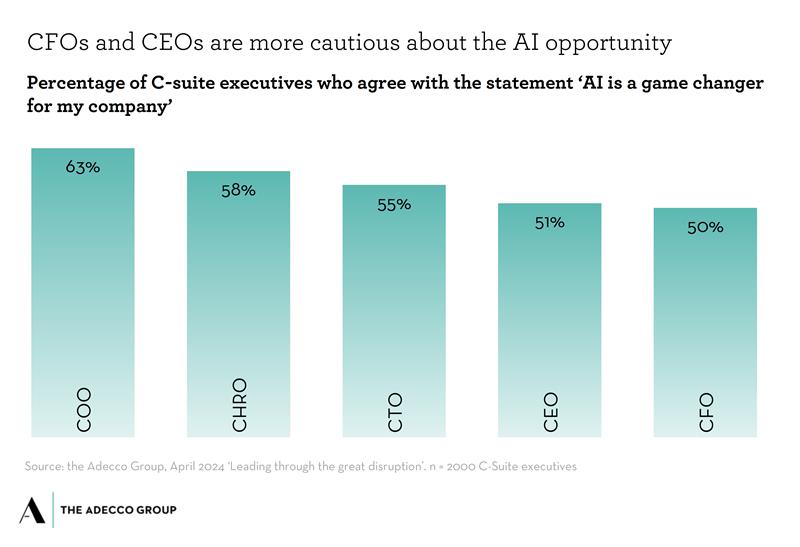
Overall, our survey reveals a striking lack of urgency to act despite clear enthusiasm. The support for AI, from both leaders and the workforce, should be used as a lever to help organisations push forward with transformational plans. Leaders in strategic roles must be convinced of the business benefits of AI to accelerate adoption.
Leaders are not ready
Our research shows skills gaps at C-suite level. This will reverberate across companies and impact how effectively emerging technology can be implemented.
The majority of global leaders lack confidence in their leadership team’s AI skills and knowledge, meaning they are less likely to understand the risks and opportunities that come with AI deployment and create a beneficial strategy for its responsible implementation.
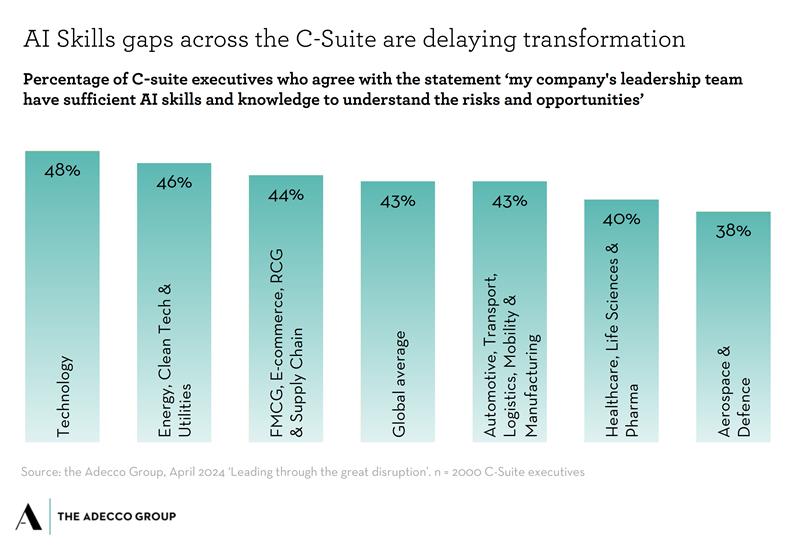
Not only does the unreadiness of leadership teams affect the overall strategic output of an organisation, but it also affects the workforce. Leaders who do not currently understand emerging technology are less likely to provide guidance and training to their workforce.
According to our research, under half (43%) of the leaders who lack confidence in their team’s knowledge offer upskilling opportunities to their employees. Conversely, of those who believe their leadership team have the requisite skills, 57% say they do offer those opportunities.
To navigate AI disruption, companies must strengthen leadership development programmes with a focus on managing complex change and uncertainty. In turn, leaders urgently need training in AI skills, including regular contextual updates to keep up with the pace of change.
Responsible frameworks underpin AI success
The workforce must have confidence that emerging technologies are governed by responsible policies and frameworks. Whether an organisation is looking for AI to play a role in workforce planning, or to assist in expanding its talent pool, ‘digital trust’ must remain front of mind. Right from the start, businesses need to create a framework for how they use AI ethically and responsibly.
However, even though 67% of leaders recognise that digital trust will significantly impact their business in the next five years, fewer than half have a framework in place for the ethical and responsible use of AI.
This lack of urgency in building digital trust may impact companies in a variety of ways in the immediate future. Our research shows that companies with a responsible AI framework have higher-skilled leaders, more AI training and guidance for employees, and are more positive about workforce opportunities.
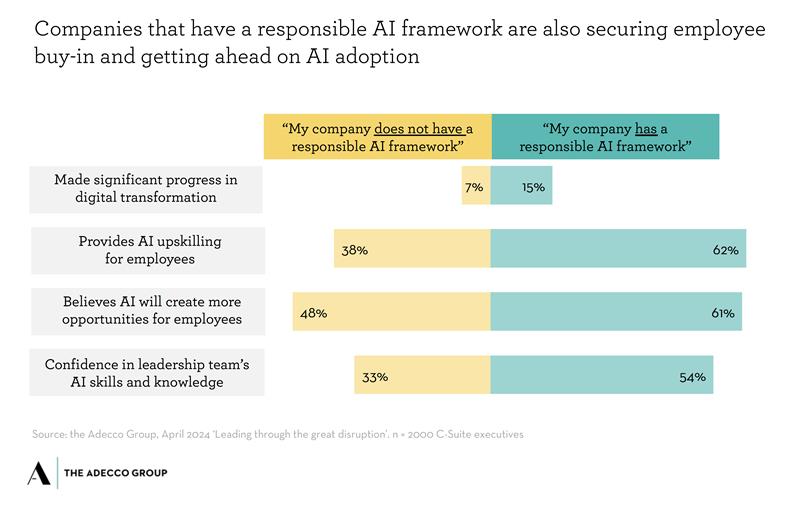
The ‘buy vs build’ talent strategy is not sustainable
The adoption and deployment of AI technology is making the job market even more competitive, with almost all jobs requiring some digital and tech skills.
Two-thirds (66%) of the leaders surveyed are planning to recruit new talent to fill positions requiring AI skills, rather than train their existing teams. This approach could create a ‘skills crunch’ that can drive up wages. This demand for talent could explain why 72% of business leaders say pay for AI-related job roles is likely to increase in the next 12 months.
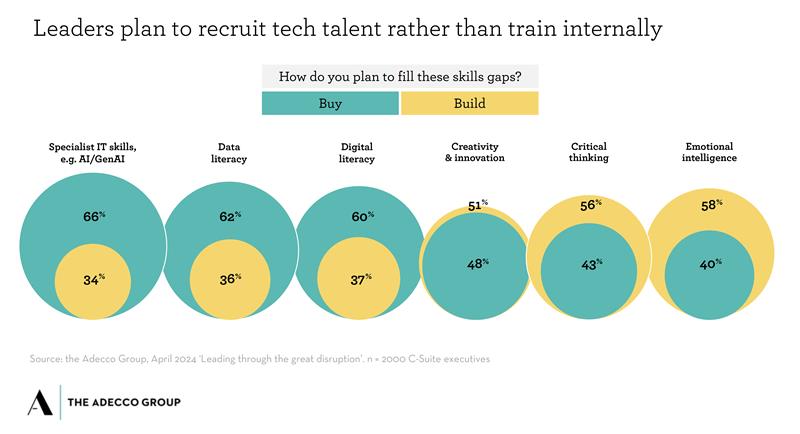
AI helps to create a human-centric business
Leaders believe the biggest skills gap currently lies in creativity and innovation. The huge rise in AI technology doesn’t mean that these skills will become obsolete. 57% of leaders think the human touch is more influential than AI in the workplace, and human attributes are highly sought after. This is especially true for leaders in the tech sector. This general emphasis for human attributes may explain why 58% of leaders plan to build emotional intelligence skills internally.
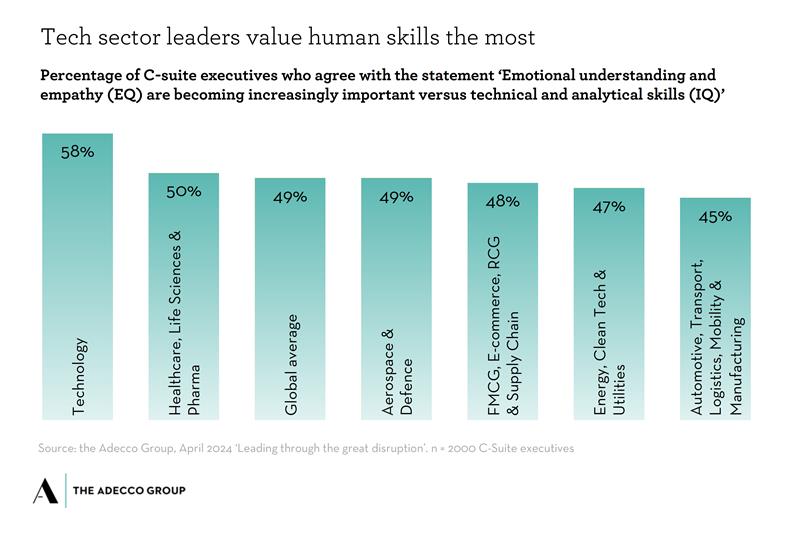
AI should be used to unlock human potential by freeing it from the burden of labour-intensive and repetitive tasks. The technology, when used responsibly, can also boost upskilling and fuel internal mobility, creating a human-centric business supported by AI technology.
Stepping into the future
Adapting to AI doesn’t mean losing out on human expertise. Business leaders have told us that human skills are as important as ever. When workers are equipped with AI skills and knowledge and they use it in their daily work life, their creativity and innovation will be unleashed.
However, leaders themselves will need to embed adaptive leadership into their organisation – accepting the requirement to manage constant tensions and deliver on paradoxical demands - as well as develop AI skills of their own. They also need to build frameworks for the ethical use of AI in their businesses – with some urgency – to build trust in how these tools are used.
With digital and technology skills impacting almost every role, organisations should consider whether recruiting new talent is the most effective method, or whether closing skills gaps through upskilling and reskilling could bolster internal mobility and ensure sustainable employment for current employees.
Integrating AI tools throughout the workforce will give employees more time to focus on creative tasks. Transferable skills and uniquely human attributes should be developed with coaching.
Download Leading through the great distruption to learn more about the trends impacting the ways we work, and the actions business leaders can take to ensure their organisation is ready to adopt, and adapt to, the AI revolution.



